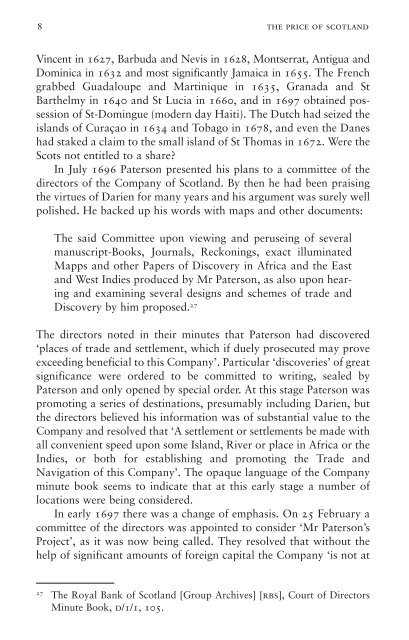You also want an ePaper? Increase the reach of your titles
YUMPU automatically turns print PDFs into web optimized ePapers that Google loves.
<strong>Price</strong> <strong>of</strong> <strong>Scotland</strong> B format_Layout 1 03/11/2020 11:09 Page 8<br />
8 the price <strong>of</strong> scotland<br />
Vincent in 1627, Barbuda and Nevis in 1628, Montserrat, Antigua and<br />
Dominica in 1632 and most significantly Jamaica in 1655. <strong>The</strong> French<br />
grabbed Guadaloupe and Martinique in 1635, Granada and St<br />
Barthelmy in 1640 and St Lucia in 1660, and in 1697 obtained possession<br />
<strong>of</strong> St-Domingue (modern day Haiti). <strong>The</strong> Dutch had seized the<br />
islands <strong>of</strong> Curaçao in 1634 and Tobago in 1678, and even the Danes<br />
had staked a claim to the small island <strong>of</strong> St Thomas in 1672. Were the<br />
Scots not entitled to a share?<br />
In July 1696 Paterson presented his plans to a committee <strong>of</strong> the<br />
directors <strong>of</strong> the Company <strong>of</strong> <strong>Scotland</strong>. By then he had been praising<br />
the virtues <strong>of</strong> Darien for many years and his argument was surely well<br />
polished. He backed up his words with maps and other documents:<br />
<strong>The</strong> said Committee upon viewing and peruseing <strong>of</strong> several<br />
manuscript-Books, Journals, Reckonings, exact illuminated<br />
Mapps and other Papers <strong>of</strong> Discovery in Africa and the East<br />
and West Indies produced <strong>by</strong> Mr Paterson, as also upon hearing<br />
and examining several designs and schemes <strong>of</strong> trade and<br />
Discovery <strong>by</strong> him proposed. 27<br />
<strong>The</strong> directors noted in their minutes that Paterson had discovered<br />
‘places <strong>of</strong> trade and settlement, which if duely prosecuted may prove<br />
exceeding beneficial to this Company’. Particular ‘discoveries’ <strong>of</strong> great<br />
significance were ordered to be committed to writing, sealed <strong>by</strong><br />
Paterson and only opened <strong>by</strong> special order. At this stage Paterson was<br />
promoting a series <strong>of</strong> destinations, presumably including Darien, but<br />
the directors believed his information was <strong>of</strong> substantial value to the<br />
Company and resolved that ‘A settlement or settlements be made with<br />
all convenient speed upon some Island, River or place in Africa or the<br />
Indies, or both for establishing and promoting the Trade and<br />
Navigation <strong>of</strong> this Company’. <strong>The</strong> opaque language <strong>of</strong> the Company<br />
minute book seems to indicate that at this early stage a number <strong>of</strong><br />
locations were being considered.<br />
In early 1697 there was a change <strong>of</strong> emphasis. On 25 February a<br />
committee <strong>of</strong> the directors was appointed to consider ‘Mr Paterson’s<br />
Project’, as it was now being called. <strong>The</strong>y resolved that without the<br />
help <strong>of</strong> significant amounts <strong>of</strong> foreign capital the Company ‘is not at<br />
27<br />
<strong>The</strong> Royal Bank <strong>of</strong> <strong>Scotland</strong> [Group Archives] [rbs], Court <strong>of</strong> Directors<br />
Minute Book, d/1/1, 105.


















